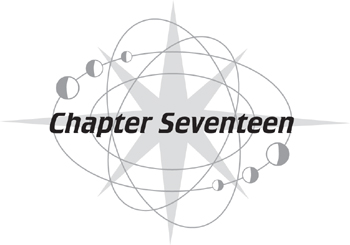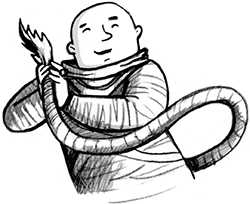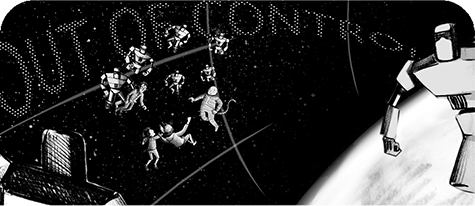
George looked around. Apart from the people, Ebot, and the robots, the room held nothing at all apart from amazing views. He looked at the word “Quantum” spreading out across the transparent sphere, and a light went on in his brain.
“This is it, isn’t it?” he said. “This is the quantum computer. . . . We’re inside it! I don’t know how it works, but I just know that this is it.”
“Oh, so clever!” said their host. “As you’ve made what some people would erroneously describe as a quantum leap, I shall fill in the rest for you. Embedded in the crystalline structure of this chamber are the billions of quantum dots that make up the quantum computer. The whole spaceship has them throughout, but in other locations they are ordinary non-quantum computer particles. This room is special because in here we have my quantum computer.”
“But what powers it?” For a moment George was lost in wonder at the technological brilliance of this achievement.
“Solar power, of course. The millions of dots inside the infrastructure of the spaceship scavenge power from the Sun.”
“Well, we know what you’re using it for,” said Annie, sounding very unimpressed. The sharp tone of her voice woke George up and reminded him that they were not here to marvel at the technology and the view.

“Do you?” The man floated over to position himself right in front of them. They could just see the blue, yellow, green, and white of their home planet, outlined against a dark sky, the view only slightly spoiled by the madman in a Jupiter-striped onesie.
He twitched his tail again, and the glass sphere around them lit up with tiny pinpricks of light. George and Annie felt as though they were suspended in the middle of a crowd of fireflies. “It really has been the most extraordinary week so far,” the man told them. “I can’t remember when I last had such a good time. Who would have thought the dear old Earth would react so quickly to my little modifications? They were just supposed to be tiny tweaks to make it a better place. But—oops—I wonder if I overshot the mark, just a teensy little bit . . .”
The two kids looked astonished. George felt his jaw drop.
“Make the Earth a better place?” echoed Annie, having recovered the power of speech first. “That’s soooo not true! Who are you, anyway?”
“Take a guess!” said the onesie wearer. “You did so well last time.”
“You’re I AM,” said George.
“I AM coming to save you. . . .” Annie realized now just what the voice had meant by this sentence.
“Oh, so many delightful possibilities!” said I AM. “You see now how clever I am.”
“Yes, we do,” said George, hoping to get some more information by playing along. “But you see, we’re not so clever—at least, not as clever as you. We’d like to learn to be, if only you could teach us. . . . To start with, could we know your name?”
“My name,” I AM replied, clearly pleased by George’s compliment, “is Alioth Merak. I, Alioth Merak—”
“Hang on,” said Annie. “That’s not a real name. That’s two of the stars of the Big Dipper!”

“Exactly!” crowed Alioth Merak. “I don’t really exist. That’s the exciting part. That’s why I’m so hard to find. You could search and search for me—and you won’t find me anywhere. Not a single mention . . . It’s the true luxury of our age—complete anonymity. Almost impossible in this era of information. But yet I have managed it.” He preened for a second, stroking his arm with his tail and looking extremely pleased with himself.
“Easy,” said George, “with an invisible spaceship and a quantum computer.”
“Easier,” corrected Merak. “Not easy—after all, I had to make the spaceship and the computer first.”
“Are you very rich?” asked Annie bluntly.
“Excessively so,” said Merak casually. “That’s what makes it all such fun!” He turned a few somersaults in midair to express his joy and happiness at being him.
George and Annie exchanged glances. It seemed very unlikely, thought George; he was talking to an adult, but he felt like the grown-up compared to the juvenile Alioth Merak.
“If you’re so rich,” persisted Annie, “why don’t you get a better onesie? That one is really uncool.”
Merak turned on her, furious, all the smiling good humor wiped off his face in an instant.
“How dare you, you horrible little girl!” he spat. “How dare you—you insignificant, ridiculous vile little worm—make a comment about me, the amazing, the magnificent I Am! Don’t you know, I am saving the world!”
“How are you doing that?” George intervened, anxious to screen his friend from further attacks by this cranky and probably very dangerous man.
“The Earth,” Alioth Merak began, sounding serious now, “our beautiful planet, is beset with terrible evils: inequality, unhappiness, hoarding of resources; great wealth, great poverty. The rich have to police their land, their countries, their possessions with weapons, armies, and guards, while the poor starve. No one is happy. No one is having fun.”
“So your plan was to make people have more fun?” Annie wrinkled her nose. “That’s the solution? Are you for real?”
“No,” said Merak, throwing her a scathing look. “I would have thought it was perfectly clear that there is nothing ‘real’ about me, idiotic small girl with intellectual pretensions.”
He turned to George and smiled. Clearly Merak had decided that he liked one of them and hated the other. “My plan was, simply and brilliantly, to make the world a better place. . . . What’s that you say . . . ?” Suddenly he appeared to address some invisible person. “Can you repeat? . . . Copy. I read you. . . . What do you mean, the penguins have been exterminated?”
“What!” shouted Annie. “You can’t exterminate penguins!”
“Too late, I’m afraid,” said Merak. “It seems they’re already dead.”
“Who were you just talking to?” said George, horrified. It seemed to him that this man was becoming more deranged by the second.
“My head is a cell phone,” Merak told him. “I had an implant robotically inserted, deep into my brain, which means that I have no need of a handset to communicate with my mechanical troops.”
“Where are your troops?” said Annie, thinking of her mom and George’s family in the basement and suddenly feeling very afraid. “And do you just have robots or do you have people too?”
“People!” snorted Merak. “Are you kidding? Why would I need people when I’ve got my own robot army? I think you’ve seen one or two of them already. A couple of them are in Foxbridge. For now, they are few and strategically placed, but soon they will be far more numerous. I just have to give the command to my network of 3-D printers on Earth, and they will appear, as if by magic, ready to take control and make the world a better place!”
“I get it now,” murmured George to Annie. “I see the link.”
“What’s that, boy?” cried Merak. “Speak up so everyone can hear you!”
“I get it!” said George loudly. “The banks and the free money—the supermarkets and the free food, opening the dams, stopping the military aircraft, cutting off networks that might hurt people. You think all these things are nice things to do!”
“Clever boy! They were random acts of kindness,” replied Merak, thrilled to see that George had finally worked it out. “They were poor, so I gave them money. They were hungry, so I gave them food. They were thirsty, so I made water in the desert. They were scared, so I made the bombs stop.”
“Whoa,” whispered Annie. “He thinks he’s a sort of God.”
“In a onesie,” added George.
“But why?” said Annie out loud. “I don’t understand why you have to do these things. . . . Why can’t you just live on your space station and leave Earth behind, if you think it’s all such a disaster?”
“Because he wants power over everyone else,” chipped in George. “He’s not being nice. He’s messing up the world so he can step in and save it afterward. His robots take over, and no one will be able to stand against them—and then he will rule from the space station because he has control of all the computers on Earth!”
“I’m so misunderstood!” said Merak, making a sad face. “I thought you ‘got’ me, George—not like your illiterate little friend over there. We had to offer some goodies to the people of the world; then, once they’ve gorged themselves on an overdose of everything they thought they wanted, they’ll be ready for a kind and compassionate but firm leader. Perhaps you’re just not mature enough to appreciate the finesse of my plan.”
“And this ‘great leader’ . . . that’s you, is it?” asked George.
“You weren’t very compassionate to the penguins!” said Annie hotly.
“Well, that was an accident. . . .” Merak coughed. “I didn’t mean for that to happen.”
“Hang on . . . ,” said George slowly. “I AM is not the only set of letters we’ve come across. There’s QED as well. That’s what your robot was trying to say when it came after us on the Moon. What does QED mean, and why did your robot want to kidnap Eric?”
“I know!” Annie declared. “I know now what it stands for.”
“Do you?” sneered Merak. “Is it ‘Definitely Quell Excitement’?”
“No!” she shouted. “It stands for ‘Quantum Error Detection’!”
“It does!” said George, realizing his friend was right. “Quantum Error Detection! That’s what Eric does on the quantum computer—which is why you wanted him.”
“You can’t work it, can you?” said Annie in sudden delight. “It’s just like Dad said—you can make a quantum computer but you can’t control it. Dad is the only person on Earth who could help you, so you tried to capture him so that he would control the quantum computer for you!”
Merak looked mutinous. He folded his arms.
Annie stepped closer to George and whispered, “If he twitches his tail, run!”
George nodded. They needed to get away, but where would they run to? Suddenly he realized something even more important . . . Annie must think that the control for the quantum computer was located in the tail of Merak’s onesie—that’s why he’d been twitching it. Aha! he thought. So that’s what we need to get hold of.
“Maybe,” said Merak defiantly. “Maybe you have a point. So what? What are you going to do about it? Whose spaceship is this anyway?”
“It’s not just the quantum computer that’s out of control,” muttered Annie.
Her words were suddenly written in huge glowing dots on the curved inner surface of the globe. Out of control flashed up in red, green, and blue.

“Well, tell me what you really think, why don’t you?” said Merak unpleasantly, his words scrawled in loopy script against the dark backdrop of space.
“Did you mean it to do that?” asked George innocently as his words scrolled out in a pattern around him, like writing with a sparkler, only permanent.
“No!” said Merak. “I did not. I did not order this to happen. Turn it off!” he shouted. “Turn it off!” He grabbed his tail and twitched it several times. But it made no difference. His words kept appearing in great graceful curving arcs. “The audio receptors have switched themselves on somehow!”
“Here’s what I really think . . . ,” said Annie, ignoring him. As she spoke, her words flashed up in crazy squiggles, whirling around the globe. “You don’t want to help people at all. You’re just pretending you do because in your fried little brain it means that you can justify taking over the world. If you tell yourself enough times that you’re doing the right thing, you start to believe it. But that still doesn’t make it okay. Because we know the truth—we know that what you really want is to be the only person who gets to say what happens. You used the quantum computer to break every code on Earth so that you could get into all the different systems, read all the messages, change all the commands—a sort of massive cyber-terrorism attack. You did this so that you and only you would know everything. But we’re not going to let you get away with it. I know you think I’m stupid and George is just a geek, but we’re going to stop you,” she finished. If she hadn’t been floating, she would have stomped her foot for emphasis.
By the time she stopped speaking, the whole sphere was alive with words, shining in an infinite maze of patterns and swirls. George watched with respect—Annie’s speech was way better than the one he’d been getting ready for I AM. And she’d delivered her version with complete clarity and force. She was, he realized, pretty unique.
George wasn’t the only one who was impressed by Annie’s speech. While she was talking, the fierce-looking robots looked around, fascinated by the kaleidoscopic effect of the glowing words. Instead of standing guard, monitoring the chamber, alert to any threat to their leader, they had relaxed their rigid stances and simply gazed at the illuminated surface.
There was a loud crash, and George realized that two of the robots had been so entranced by the word trail of Annie’s speech that they had crashed into each other. The expressions on the faces of the others seemed to have softened in the multicolored glow from the spherical screen.